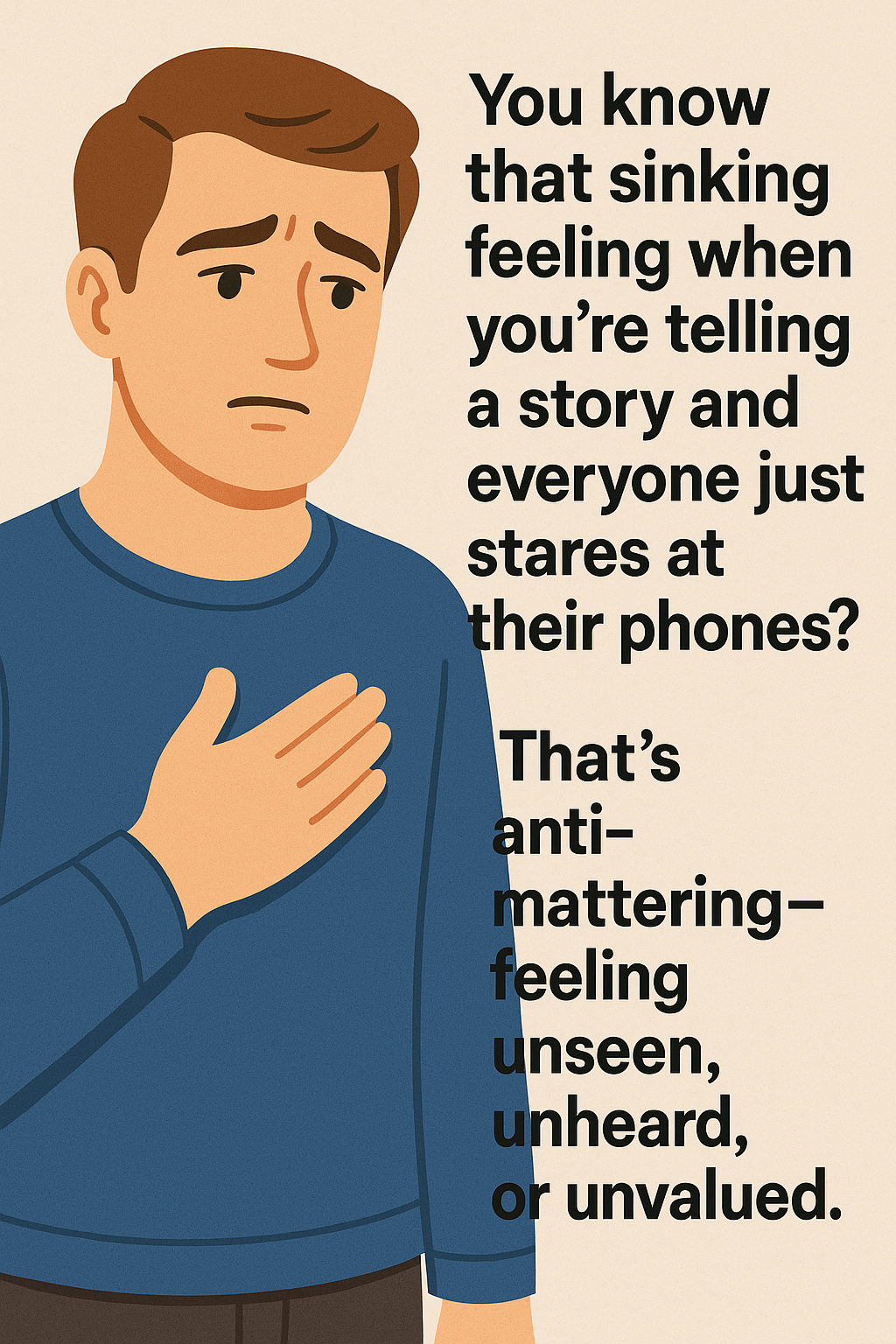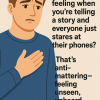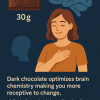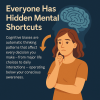Loneliness
The Hidden Crisis Making You Feel Invisible
How 30 Minutes Could Change Everything
Why feeling like you don't matter is destroying your mental health—and what science reveals about the surprisingly simple fix
━━━━━━━━━━━━━━━━━━━━━━━━━━━━
Picture this: You're scrolling through social media at 11 PM, surrounded by messages and notifications, yet feeling completely alone. You send texts that get read but not answered. You contribute ideas at work that seem to disappear into thin air. You show up for people who never seem to show up for you.
Sound familiar? You're not broken, lazy, or "too sensitive." You're experiencing what researchers now recognize as one of the most devastating—yet invisible—crises of our time.
- Key points
-
🎯 Point 1: The Loneliness Paradox
We're more connected than ever, yet loneliness is epidemic. The problem isn't lack of contact—it's lack of significance. Research shows the quality of interactions matters more than quantity. You can be surrounded by people and still feel invisible.
━━━━━━━━━━━━━━━━━━━━━━━━━━━━
🧠 Point 2: Your Body Keeps Score
Feeling like you don't matter triggers the same stress response as physical danger. Studies prove that chronic feelings of insignificance cause measurable harm: higher blood pressure, elevated stress hormones, and increased depression risk. Your nervous system can't tell the difference between being ignored and being threatened.
━━━━━━━━━━━━━━━━━━━━━━━━━━━━
⚡ Point 3: Mattering Happens in Moments
You don't need grand gestures—you need micro-connections. Research reveals three simple ways people feel significant: being noticed (someone remembers details about your life), being affirmed (someone acknowledges your impact), and being needed (someone shows they rely on you). These 30-second interactions can rewire your sense of worth.
━━━━━━━━━━━━━━━━━━━━━━━━━━━━
Bottom Line: The cure for feeling invisible - loneliness isn't more connections—it's moments where you feel genuinely significant to another person. And that can happen in the next conversation you have.
━━━━━━━━━━━━━━━━━━━━━━━━━━━━
🔴 The Crisis Hiding in Plain Sight - Loneliness
Recent research reveals that one in three Americans feels persistently lonely, but here's what's shocking: we're more connected than ever before. The average adult sends 30-40 text messages daily, attends countless meetings, and joins multiple online communities.
So why are we still drowning in isolation and loneliness?
The answer isn't about connection—it's about mattering.
Psychologist Alexander Danvers' research shows that the quantity of interactions doesn't reduce loneliness. The quality does. It's not the lack of social contact that drives loneliness—it's the lack of perceived social value to others.
Most people think the opposite of loneliness is having more people around you. The truth? It's feeling that you matter to the people around you.
━━━━━━━━━━━━━━━━━━━━━━━━━━━━
🧠 Why Your Brain Is Wired to Need Mattering
From our first breath, our survival depends on being important to someone. Scientists call this the "grasp reflex"—an automatic response initiated to secure our first caring relationship. When a newborn grips your finger and won't let go, they're not just being cute. They're following six million years of evolutionary programming that says: I need to matter to survive.
As we grow up, this survival instinct evolves into the fundamental need to be seen, heard, and valued. When that need goes unmet, your nervous system interprets it as a threat—literally.
Here's the science: In 2019, sociologist John Taylor and his team studied over 1,000 men and women. They found that when people indicated feelings of not mattering to others, they had objectively higher blood pressure and elevated levels of hormones that drive chronic stress and activate the body's fight-or-flight system.
Your body doesn't distinguish between being chased by a tiger and feeling invisible at work. Both trigger the same stress response.
━━━━━━━━━━━━━━━━━━━━━━━━━━━━
⚠️ The Three Warning Signs You're Living with "Anti-Mattering"
Warning Sign #1: The Engagement Trap You've probably been told you're "disengaged" or "unmotivated." But psychologist Gordon Flett calls this anti-mattering—feeling unseen, unheard, or unvalued.
Consider this real story: A maintenance worker noticed sprinklers splashing windows she cleaned every morning. She proposed fixing the system to save time for other tasks. Her supervisor said, "That's the sprinkler people's problem. Do your job." After that, she told researchers: "I feel pointless. Why do I bother?"
She wasn't lazy. She was experiencing the predictable response to chronic insignificance.
Warning Sign #2: The Feedback Loop of Despair University of Ottawa researcher Amanda Krygsman tracked over 450 adults for four years and found a vicious cycle: anti-mattering predicted future depression symptoms, and depression symptoms predicted future feelings of anti-mattering.
Warning Sign #3: Physical Symptoms You Can't Explain Chronic fatigue, headaches, digestive issues, sleep problems—these aren't character flaws. Ongoing feelings of insignificance can erode our physical health. Your body is keeping score of every moment you felt invisible.
━━━━━━━━━━━━━━━━━━━━━━━━━━━━
✨ The Science-Backed Solution: How Mattering Changes Everything
Here's what happens when people feel they matter: Studies show they're more motivated, grittier, and healthier. Their stress hormones normalize. Their sleep improves. They stop feeling like they're fighting for survival every day.
But how do you create mattering? The answer is surprisingly simple.
Mattering happens in moments, and research reveals three characteristics of interactions where we feel significant: feeling noticed, affirmed, or needed by others.
Think about when you last felt like you truly mattered. You probably weren't receiving awards or promotions. You were likely experiencing small interactions where someone:
- Checked in on you
- Alleviated a struggle you were facing
- Took time to understand you
- Showed genuine gratitude
- Named your potential
- Showed how they relied on you
━━━━━━━━━━━━━━━━━━━━━━━━━━━━
🎯 The 30-Minute Mattering Reset: Three Actions That Work
Action 1: Become a Better Noticer (10 minutes) We can become better noticers by slowing down, re-learning to pay deep attention, and remembering and checking in on the details of others' lives—from our delivery driver to our families to our colleagues.
Today's micro-action: Text someone asking about something specific they mentioned last time you talked. Not "How are you?" but "How did that presentation go?" or "Is your mom feeling better?"
Action 2: Affirm Someone's Impact (10 minutes) We can start affirming others by showing people the difference they make for us and making it a point to name the unique gifts they contribute to our lives or work.
Today's micro-action: Tell someone exactly how they helped you recently. Be specific: "When you listened without trying to fix my problem, it helped me think more clearly."
Action 3: Show How You Rely on Them (10 minutes) We can show people how we rely on them by saying, "If it wasn't for you…" and reminding them that they're indispensable.
Today's micro-action: Complete this sentence for someone in your life: "If it wasn't for you, I wouldn't have..."
━━━━━━━━━━━━━━━━━━━━━━━━━━━━
🚀 Why Single-Session Interventions Work for Mattering
Traditional therapy assumes you need months or years to address core issues like self-worth. But research on single-session interventions (SSIs) reveals something powerful: targeted, evidence-based techniques can create meaningful shifts in how you experience and create mattering in just one focused session.
The reason? Mattering isn't just about changing deep-seated beliefs—it's about learning specific, actionable skills for recognizing your value and helping others recognize theirs.
In a single session, you can learn:
- How to identify the exact moments when you feel most invisible
- Evidence-based techniques for interrupting the anti-mattering spiral
- Practical scripts for creating mattering in everyday interactions
- How to build resilience against the inevitable moments when you feel unseen
━━━━━━━━━━━━━━━━━━━━━━━━━━━━
💡 The Truth About Feeling Invisible
A Navajo proverb on hospitality says: "Always assume your guest is tired, cold, and hungry, and act accordingly."
Given the research on our mattering crisis, here's a rule for all of us: Always assume the people around you feel unseen, unheard, and undervalued and act accordingly.
Because here's what no one tells you: Feeling invisible isn't a personal failing. It's a predictable response to living in a world that's forgotten how to make people feel significant.
The good news? We won't solve our loneliness, disengagement, and mental health crises through more programs, platforms, and initiatives alone. We'll solve it by showing up in our next interaction and ensuring the other person feels seen, heard, and valued.
━━━━━━━━━━━━━━━━━━━━━━━━━━━━
🎯 Your Next Step
Right now, someone in your life is reaching out like that newborn in the hospital room, hoping to matter to someone. The question isn't whether you have time to make them feel significant.
The question is: Can you afford not to?
In 30 minutes, you could learn science-backed techniques that not only help you feel more significant but also become someone who helps others experience the profound relief of knowing they matter.
Because mattering isn't just about feeling better—it's about becoming the kind of person others feel safe reaching toward.
━━━━━━━━━━━━━━━━━━━━━━━━━━━━
Ready to discover how you already matter more than you know? Find out how evidence-based single-session interventions can help you recognize your significance and create it for others.
[Start Your Mattering Session →]
[Learn More About SSIs →]







